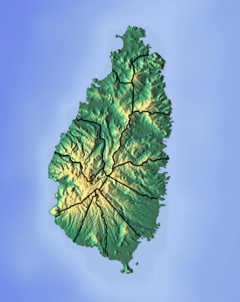
The Organization of American States is an international organization that was founded on 30 April 1948 for the purposes of solidarity and co-operation among its member states within the Americas. Headquartered in the US capital, Washington, D.C., the OAS has 34 members, which are independent states in the Americas. Since the 1990s, the organization has focused on election monitoring. The head of the OAS is the Secretary General; the incumbent is Uruguayan Luis Almagro.

Saint Lucia is an island country in the West Indies in the eastern Caribbean Sea on the boundary with the Atlantic Ocean. The island was previously called Iyonola, the name given to the island by the native Arawaks, and later Hewanorra, the name given by the native Caribs, two separate Amerindian peoples. Part of the Windward Islands of the Lesser Antilles, it is located north/northeast of the island of Saint Vincent, northwest of Barbados and south of Martinique. It covers a land area of 617 km2 and reported a population of 165,595 in the 2010 census. St. Lucia's largest city is Castries, its current capital, and its second largest is Soufrière, the first French colonial capital on the island.

Once a single-crop agricultural economy, Saint Lucia has shifted to a tourism and banking serviced-based economy. Tourism, the island's biggest industry and main source of jobs, income and foreign exchange, accounts for 65% of its GDP. Agriculture, which was once the biggest industry, now contributes to less than 3% of GDP, but still accounts for 20% of jobs. The banana industry is now on a decline due to strong competition from low-cost Latin American producers and reduced European trade preferences, but the government has helped revitalize the industry, with 13,734 tonnes exported in 2018. Agricultural crops grown for export are bananas, mangoes, and avocados. The island is considered to have the most diverse and well-developed manufacturing industry in the eastern Caribbean.

The World Meteorological Organization (WMO) is a specialized agency of the United Nations responsible for promoting international cooperation on atmospheric science, climatology, hydrology and geophysics.
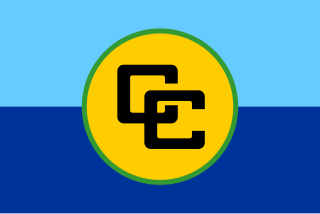
The Caribbean Community is an intergovernmental organisation of 15 member states throughout the Caribbean having primary objectives to promote economic integration and cooperation among its members, to ensure that the benefits of integration are equitably shared, and to coordinate foreign policy. The organisation was established in 1973. Its major activities involve coordinating economic policies and development planning; devising and instituting special projects for the less-developed countries within its jurisdiction; operating as a regional single market for many of its members ; and handling regional trade disputes. The secretariat headquarters is in Georgetown, Guyana. CARICOM is an official United Nations Observer beneficiary.

The Organisation of Eastern Caribbean States is an inter-governmental organisation dedicated to economic harmonisation and integration, protection of human and legal rights, and the encouragement of good governance between countries and territories in the Eastern Caribbean. It also performs the role of spreading responsibility and liability in the event of natural disaster.

The Organisation of African, Caribbean and Pacific States (OACPS) is a group of countries in Africa, the Caribbean, and the Pacific that was created by the Georgetown Agreement in 1975. Formerly known as African, Caribbean and Pacific Group of States (ACP), the organisation's main objectives are sustainable development and poverty reduction within its member states, as well as their greater integration into the world's economy. All of the member states, except Cuba, are signatories to the Cotonou Agreement with the European Union.
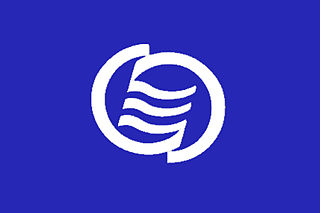
The Association of Caribbean States is an advisory association of nations centered on the Caribbean Basin. It was formed with the aim of promoting consultation, cooperation, and concerted action among all the countries of the Caribbean coastal area. The primary purpose of the ACS is to promote greater trade between the nations, enhance transportation, develop sustainable tourism, and facilitate greater and more effective responses to local natural disasters.

The Caribbean Free Trade Association (CARIFTA) was organised on May 1, 1968, to provide a continued economic linkage between the English-speaking countries of the Caribbean. The agreements establishing it came following the dissolution of the West Indies Federation which lasted from 1958 to 1962.
The Ibero-American Summit, formally the Ibero-American Conference of Heads of State and Governments, is a yearly meeting of the heads of government and state of the Spanish- and Portuguese-speaking nations of Europe and the Americas, as members of the Organization of Ibero-American States. The permanent secretariat in preparation of the summits is the Ibero-American General Secretariat (SEGIB).
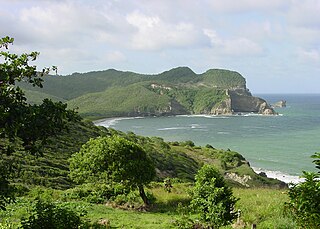
Fond d'Or Bay is a bay on the east side of the island of Saint Lucia, in the center of the coast. The Fond d'Or River has its mouth in the bay.

The Soufrière River is a river in the Soufrière Quarter on the island country of Saint Lucia. The French term "Soufrière" is a generic one referring to "Sulphury" volcanic peaks called La Soufrière or Soufrière Hills on each of St. Vincent, St. Lucia, Dominica, Guadeloupe.
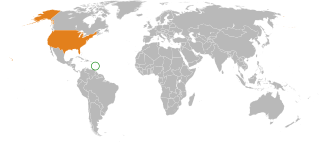
Saint Lucia – United States relations are bilateral relations between Saint Lucia and the United States. Linda Swartz Taglialatela is the U.S. Ambassador to St. Lucia.

The Caribbean is a region of the Americas that comprises the Caribbean Sea, its surrounding coasts, and its islands. The region lies southeast of the Gulf of Mexico and of the North American mainland, east of Central America, and north of South America.
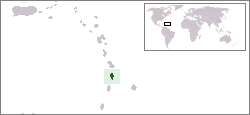
The following is an alphabetical list of topics related to the nation of Saint Lucia.

The Group of Latin America and Caribbean Countries, or GRULAC, is one of the five United Nations Regional Groups composed of 33 Member States from Central and South America, as well as some islands in the West Indies. Its members compose 17% of all United Nations members.
Kenita Placide is a human rights, HIV and LGBT activist from St. Lucia. She is the executive director of United and Strong and the Eastern Caribbean Coordinator of Caribbean Forum for Liberation and Acceptance of Genders and Sexualities (CariFLAGS). Between 2014 and 2016, she served at the Women's Secretariat for the International Lesbian, Gay, Bisexual, Trans and Intersex Association. She has been on the forefront of bringing LGBT issues into discussion throughout the Anglo-Caribbean and international community. In 2013, she was selected as Star Publishing's People’s Choice for Person of the Year in St. Lucia, the first time an LGBT person had been honored with the award in her country.
Sonia M. Johnny is a St. Lucian attorney who served as her country's first woman ambassador. She has served as the Chief Negotiator for the Caribbean, President of the Permanent Council of the Organization of American States, Chief of the OAS Department of Trade, Tourism and Competitiveness and Deputy Director of the Summits Secretariat.

